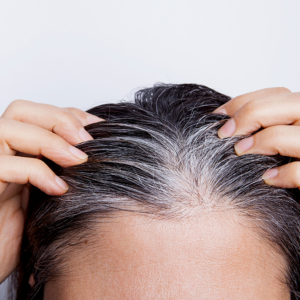WHAT IS IT?
Hair loss associated with current or recent COVID-19 infection. The pattern, timing, severity, and recovery from COVID-related alopecia varies widely. Clinical studies have recently identified hair loss syndromes that may be risk factors for COVID-19 infection, triggered by COVID-19 infection or aggravated by COVID-19 infection. Much more research is needed before these syndromes can be fully understood.
WHO IS AT RISK FOR COVID-Related Alopecia
Any person with current or recent COVID-19 infection; the prevalence in women is higher than in men. Persons with pre-existing androgenetic alopecia (AGA) (male and female pattern hair loss) may be at risk for COVID-19 infection and possibly more severe infection than those without the disease.
WHAT ARE THE SYMPTOMS OF COVID-Related Alopecia?
Early research has established that a variety of hair loss symptoms seem to be associated with COVID-19, the most common include:
- androgenetic alopecia (AGA) which may be a risk factor for COVID-19 infection
- AGA in men begins above the temples, over time the hairline recedes back towards the crown. In women, it appears as gradual thinning near the crown, however, the hairline typically stays intact.
- telogen effluvium (TE) which may be triggered by COVID-19 infection
- TE is characterized by dramatic hair shedding from the entire scalp or certain regions within 2-3 months of a triggering event such as an infection, serious organ dysfunction or malnutrition, hormonal disorders or severe stress. TE is reported more frequently in women.
- alopecia areata (AA) which may relapse or worsen due to COVID-19 infection
- AA presents as bald patches anywhere in the scalp due to an immune response that attacks hair follicles. This disorder can occur at any age but commonly initially appears during childhood or teens and can reappear anytime.
Deeper than hair:
The discovery of a hair loss disorder (androgenetic alopecia) that appears to be a risk factor for COVID-19 infection is significant. It has led to further studies that may shed light on prevention and treatment for COVID-19. The relationship between COVID-19 and hair loss, in general, may be a factor in identifying persons at risk for more severe disease from COVID or its long-term effects.
WHAT CAUSES COVID-Related Alopecia?
- The relationship between AGA and COVID-19 is thought to be the effect of male circulating hormones on the ability of the COVID-19 virus to infect cells.
- TE appears to be triggered by the body’s complex inflammatory response to the virus.
- Relapses or worsening of AA may be attributed to an immune response to the virus that subsequently attacks previously vulnerable hair follicles.
WHAT CAN BE DONE ABOUT COVID-Related Alopecia?
Solutions for COVID-related alopecia depend on the type of hair loss syndrome experienced and the stage of the infection. To date, no COVID- specific remedy for hair loss has been FDA approved. Since COVID-19 can have both short and long-term effects, in some cases, symptoms may resolve in weeks-months without intervention.
The right diagnosis is the KEY! The signs and symptoms of COVID-Related Alopecia can mimic those of other hair loss disorders. See a certified trichologist or dermatologist who specializes in hair loss to properly identify any hair loss issue that may be due to COVID infection.
Experiencing symptoms of COVID related Alopecia? DO NOT WAIT!
Get help from our certificated trichologist (hair loss specialist)
REFERENCES:
- Nguyen B, Tosti A. Alopecia in patients with COVID-19: A systematic review and meta analysis. JAAD Int. 2022;7:67-77. doi:10.1016/j.jdin.2022.02.006
- Gentile P. Hair Loss and Telogen Effluvium Related to COVID-19: The Potential Implication of Adipose-Derived Mesenchymal Stem Cells and Platelet-Rich Plasma as Regenerative Strategies. Int J Mol Sci. 2022;23(16):9116. Published 2022 Aug 14. doi:10.3390/ijms23169116
- Seyfi S, Alijanpour R, Aryanian Z, Ezoji K, Mahmoudi M. Prevalence of telogen effluvium hair loss in COVID-19 patients and its relationship with disease severity. J Med Life. 2022;15(5):631-634. doi:10.25122/jml-2021-0380
- Kalner S, Vergilis I. Retrospective Study of Covid Related Hair Loss. J Drugs Dermatol. 2022;21(7):724-727. doi:10.36849/JDD.6661






